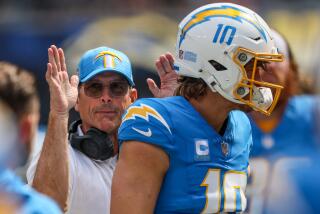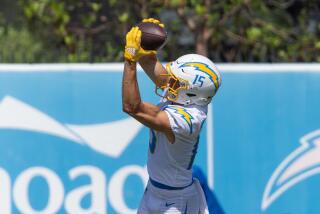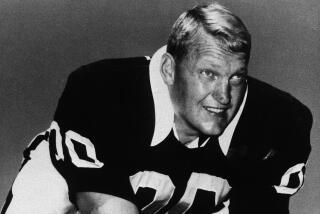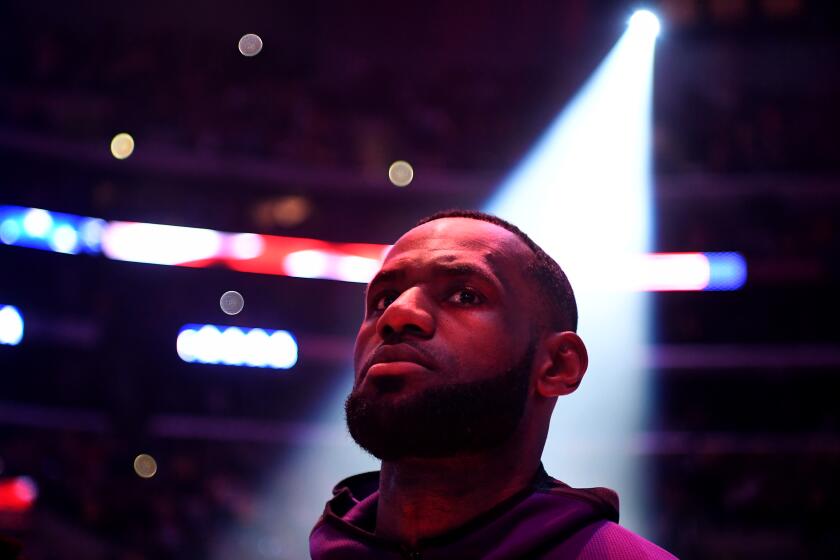Streets Paved Way for Moss’ Career : Raiders: Linebacker got his start playing on pavement before parents relented and let him play organized ball.
- Share via
Raider linebacker Winston Moss grew up with four brothers in an area of South Miami that worships football.
Around his neighborhood, young boys are introduced to football as soon as they are able to walk. They dream of the day when they can play for the local high school, Southridge, which has a legendary football tradition.
For many aspiring players, the football pipeline starts early with the hometown Pop Warner program and ends with a college football scholarship .
That, however, was not the case for Moss and his brothers.
“We wanted to play, but our parents didn’t give us the opportunity when we were younger,” said Moss, who has three older brothers and one younger. “No matter what we said, we couldn’t play.”
Moss’ father, Norman, did not let his sons play because he was afraid that they would get hurt.
“We were just worried about them,” said Norman Moss Sr., who has worked at Southridge High for more than 15 years. “We were just being protective.”
So, without any organized football program to turn to, Winston and his brothers turned to the streets to play.
“It was definitely football in the ‘hood,” said Winston, whose brother are all within six years of each other. “It would be all of the brothers on one side against everyone else in the neighborhood. We would play in the streets and tackle each other on concrete.”
Together, the Moss brothers were unbeatable against their street opponents. The only team they couldn’t defeat was their parents, who refused to let the two oldest brothers, David and Norman Jr., play once they got to high school.
The turning point came when the third oldest, Greg, went out for the football team.
At 6 feet 2 and 265 pounds, Greg did not have any problems making the move from street football to playing on grass. He went on to play defensive end at Bethune-Cookman before his career ended because of a knee injury.
For Winston, however, it was a different story. As a 5-9, 140-pound sophomore, he was not only small when he went out for fullback on the junior varsity, but he also was slow.
“When I saw how little he was on that JV team, I said to myself, ‘He’s going to get clobbered out there. He’ll get killed,’ ” Norman Sr. said.
Southridge High Coach Don Soldinger also did not give Moss much chance to become a standout player.
“Winston couldn’t play a lick when he first came out for football,” Soldinger said. “He just didn’t have it.”
What Moss did have was a desire to work to get better. After his sophomore season, he began to lift weights and the next year, he was a different player.
In a span of a nine months, Moss went from a third-team JV fullback to a starting linebacker on one of the best high school teams in Florida.
By the time Moss finished his senior season at Southridge, he had grown six inches and gained nearly 100 pounds from his sophomore year.
“He just kept getting bigger, stronger and better,” said Soldinger, whose team went 10-1 when Moss was a senior. “His work habits helped him make one great leap after another with his ability. By the time he left here, you could tell he was going to make it.”
After being one of the most sought-after prep linebackers in the nation, Moss signed with Miami, where he became a three-year starter and played on the 1984 national championship team.
He finished his career at Miami with 248 tackles, 10 for losses, two sacks and three fumble recoveries--good statistics, but not good enough to overshadow big-play teammates such as Jerome Brown, Alonzo Highsmith and Bennie and Brian Blades.
After being drafted by the Tampa Bay Buccaneers in the second round of the 1987 draft, Moss played on 4-11, 5-11, 5-11 and 6-10 teams, which was painful for him to endure.
From his street-playing days in South Miami to playing for the Hurricanes, Moss was used to winning. Losing 43 games in four years was simply too much, and what made matters worse was that Tampa Bay was playing him out of position.
As their pass-rushing specialist, Moss was called inconsistent after he had only 10 1/2 sacks in four seasons.
“I couldn’t take it there any more after my fourth season, so I asked my agent to get me traded,” Moss said.
After making outside linebackers Broderick Thomas and Keith McCants their No. 1 picks in 1988 and 1990, Tampa Bay finally granted Moss his wish before the 1991 season and traded him to the Raiders.
“I didn’t believe it when my agent called and said that I had been traded,” Moss said. “I had to call Tampa Bay’s office to confirm it before I allowed myself to celebrate.”
Being traded to the Raiders was a blessing for Moss and also a key addition for the Raiders.
“We liked Winston when he was coming out of college,” Raider Coach Art Shell said. “We felt he could run and cover backs out of the backfield. So when the opportunity came to go get him, we did.”
In his first season, Moss replaced veteran Jerry Robinson and started every game for the Raiders. He finished third on the team in tackles with 80.
Last season, Moss got off to a slow start after holding out in training camp. He struggled because of injuries and sat out the first non-strike game of his career. But Moss went on to finish second in Raider tackles with 91, including two sacks.
Before the start of this season, Moss, 27, was designated Raider defensive captain and is playing better than ever.
The Raiders, who have a bye this week after a 4-2 start, lead the NFL in sacks, primarily because of end Anthony Smith. Moss is comfortable with his unsung role.
“Being a linebacker on this team and to get attention is very tough,” Moss said. “We have such a great group of defensive linemen that we don’t have to blitz that often, and we’re only asked to cover and make the plays we’re supposed to.”
Which is something Moss is used to, according to Soldinger, who also had a chance to coach Moss at Miami for three years.
“He might not make the big plays, but he makes the plays,” Soldinger said. “Getting recognition is great, but it’s short-lived. Staying power is what is important in the NFL, and that is what Winston Moss has.”
More to Read
Go beyond the scoreboard
Get the latest on L.A.'s teams in the daily Sports Report newsletter.
You may occasionally receive promotional content from the Los Angeles Times.










